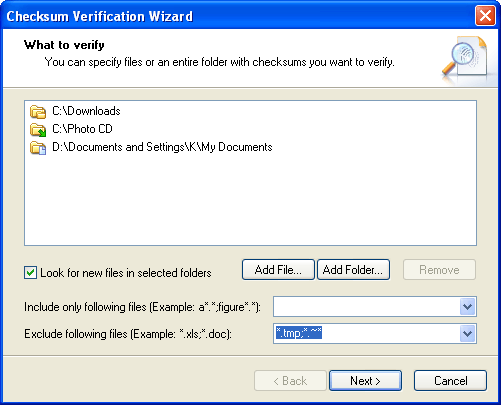
REM = If the second parameter IS NOT PROVIDED, all available hashes are REM = When done, a success/fail message is displayed. REM = a hash to verify against the file and all available hashes are used. REM = If the second parameter IS NOT an available hash method, it is used as REM = it is compared to the computed hash, and a success/fail message REM = If the second parameter matches an available hash method, it is used REM = and third are figured out contextually.
WINDOWS MD5 CHECKSUM HOW TO
The remarks at the top show how to use the script, and there is also a usage prompt if no parameter is provided or the first parameter is a file that doesn’t off Here’s a script I wrote that takes the information in this article and shows or checks the checksum.
WINDOWS MD5 CHECKSUM WINDOWS
In the subsequent versions of Windows the case doesn’t matter. Be sure to type, for example, not “md5” but “MD5”. Hash Algorithms: Note that on Windows 7, the hash algorithms are case-sensitive. PS C:\> $(CertUtil -hashfile C:\file.img MD5) -replace " ",""Īvailable hash algorithms: MD2 MD4 MD5 SHA1 SHA256 SHA384 SHA512 SHA256 checksum example ( sha256sum): C:\> certUtil -hashfile C:\file.img SHA256Ĭ:\> CertUtil -hashfile C:\file.img MD5 | findstr /v "hash" MD5 checksum example ( md5sum): C:\> certUtil -hashfile C:\file.img MD5
WINDOWS MD5 CHECKSUM ZIP
In this note i will show the examples of how to make md5sum and sha256sum of a file in Windows from the command line.Ĭool Tip: zip and unzip from the command line in Windows! Read more → MD5/SHA256 CheckSum in WindowsĬhecksum a file in Windows using the built-in certUtil command-line utility: C:\> certUtil -hashfile If you would like to suggest a correction to an existing translation, please file a bug.In Windows you can make a checksum of a file without installing any additional software.įor this you can use the certUtil – built-in command-line tool that works both in Windows CMD and PowerShell. If you would like to contribute a translation, please translate and submit this file.


In addition to integrating file checksumming functionality into Windows, HashCheck can also create and verify SFV files (and other forms of checksum files, such as. The HashCheck Shell Extension makes it easy for anyone to calculate and verify checksums and hashes from Windows Explorer.


 0 kommentar(er)
0 kommentar(er)
